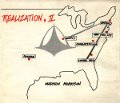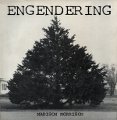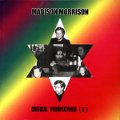MADISON MORRISON: A bio-bibliography
Born June 28, 1940, I grew up in North
American cities, Pittsburgh, Detroit and Chicago, where my father
worked as a sales executive for US Steel. I attended primary and
secondary schools in Grosse Pointe Farms, Michigan before
completing my secondary education with two years at The Choate
School in Wallingford, Connecticut. In 1961, at the age of 20, I
graduated from Yale. In 1962 I received a master's degree, in 1969,
a doctorate from Harvard, in English and American Literature. I
wrote a dissertation on the American poet, Wallace Stevens. During
a two-year interval, 1965-1967, I taught for The University of
Maryland on military bases in Germany (at Spangdahlem, Rhein-Main
and Darmstadt), in France (at Garches and St. Germain, in the
environs of Paris), again in Germany (at Kaiserslautern, Frankfurt
and Wiesbaden) and, finally, in Greece (at Iraklion). Married in
1963, I spent the summers with my wife at her parents' cook's
retirement home in Brittany. During this period I became quite
fluent in German and French, a fluency later sacrificed to Chinese.
In the summer of 1960 I studied enough Russian to sing folk songs
in the Yale Russian Chorus and tour the then Soviet Union, arguing
politics in public places with its citizens after impromptu
concerts. I now read enough Italian to understand literary
correspondence. Earlier I had studied Latin, in high school and as
preparation for a graduate school exam, which enabled me to read a
few books of the Aeneid. I studied neither Greek nor Sanskrit, but
in India, Thailand and China as well as in the USA and Europe I
have taught in translation Greek, Roman, Indian and Chinese, along
with modern continental European, literature. For a dozen years I
taught English literature in a Chinese university.
Having served as assistant in humanities
courses at Harvard, 1963-1965, and as instructor for two years with
Maryland, I returned to serve as tutor at Harvard, 1967-1969, while
I was completing my dissertation under Harry Levin's supervision.
This led to my first professorship in 1969 at The University of
Oklahoma, where I specialized in modern British and American
poetry. During a 23-year career in Norman I expanded my academic
interests by offering three courses in the literature and art of
Dada-Surrealism, four in film history and criticism, many in
comparative European literature, one in Chinese landscape painting,
another in the foundations of Indic culture and civilization. I
also taught American literature, religious texts and creative
writing. While on sabbatical leave from Oklahoma I wrote half the
chapters of a collaborative novel, Revolution, those
concerned with ancient China and contemporary France. In describing
Paris through the eyes of a contemporary Breton (see Chapters 4 and
8) and a character transported from ancient China to contemporary
France (see Chapter 6), I practiced in situ writing for the first
time. Seven years later, on a second sabbatical leave, I composed
Realization, a travelogue of the USA that interweaves the
Upanishads, Dhammapada and Bhagavad Gita with in situ description
of three round trips, from Norman to Houston, from Norman to Boston
and from Norman to San Francisco. I attended a National Endowment
for the Humanities Seminar in Chinese Literature at Stanford, and
other grants, from the National Endowment for the Arts and the
Ingram Merrill Foundation, allowed me to finish two books. My first
publications were pamphlets of verse, Girls (Milwaukee, WI:
Morgan Press, 1976) and Poems (New York: Paranthèse,
1977).
During the summer of 1975 I conceived my
life-long project, the cosmological epic, Sentence of the
Gods. At the time I had already finished its first three
volumes, which later appeared as Sleep,
O and
Light (Norman, OK: The Working Week Press, 1981, 1982,
1983); U, Need and
A followed but had to await
publication till SOLUNA: Collected Earlier Poems (New Delhi:
Sterling, 1989). The seventh book, Revolution, co-authored
by Dan Boord, appeared first in its original twelve-chapter version
(Taipei: Bookman Books, 1985), thirteen years later, in a
five-chapter, bilingual English-Chinese redaction, MM's
Revolution (Taipei: East & West, 1998). The eighth book,
Each (St. Petersburg: The Working Week Press, 2000),
followed. The next two books, one based upon the Bible, the other,
upon Homer and Vergil, appeared four years later as the diptych
Every Second (Alexandria: The Working Week Press, 2004).
Magic (Memphis: The Working Week Press, 2000), the eleventh
book in the sequence, had preceded the diptych, as had the twelfth,
Realization, whose first two installments,
Realization,I and Realization,II (Norman, OK: Poetry
Around, 1986, 1988) were followed by the Anterem edition of the
complete text (Verona: Anterem Edizioni, 1996). Engendering,
thirteenth in the sequence, first appeared in the USA (Norman, OK:
Poetry Around, 1990), twelve years later in Taiwan (Taipei: Cosmos
Culture, 2002) with a Chinese preface by Han Wei-min and an English
afterward by Frank W. Stevenson, titled
"Sign and Ritual in
Morrison's Engendering." Of the next four books in the
Sentence only the seventeenth, All, has yet appeared,
in a collection of five books titled SCENES FROM THE PLANET: In,
All, Excelling, Or, Divine (New Delhi: Sterling, 2001).
Possibly, the eighteenth book in the
sequence, based upon the hypertext of Cervantes, and still in
progress, will draw upon my experience, during a 1999-2000 trip
around the world, of the Luso-Hispanic realms of South America and
Iberia. The nineteenth, an epic of India, for which I gathered
material during a 1988-1989 assignment as Fulbright Lecturer, has
appeared as Happening (New Delhi: Sterling, 1997).
Renewed, the twentieth book, also in progress, will draw
upon my experience of Alexandria, the Nile and Cairo. Taking Spenser as hypertext, it will follow the
tripartite structure (Books I-II, III-IV and V-VI) of his Faerie
Queene. Or, the twenty-first book, a study of Thailand,
appeared originally in the USA (Bellows Falls, VT: Tiger Moon,
1999) and has been reprinted in Scenes from the Planet. The
twenty-second, an allegory of northern Italy, which takes Dante as
its hypertext and alludes to his Divina Commedia, to Ariosto's
Orlando Furioso and to Tasso's Gerusalemme Liberata, like
In, the twenty-third, a study of four Scandinavian countries
(Norway, Sweden, Finland and Denmark), appeared for the first time
in Scenes from the Planet. There remain only three books in
the sequence: This, the twenty-fourth, will combine Ovid's
Metamorphoses with Lady Murasaki's Diary, Roman with Japanese
history. (I hope to find a Japanese versed in Roman culture and
tolerant of my ignorance of Japan, so that we may collaborate.) The
twenty-fifth book, Excelling, describes my 1992 trip to
China's southernmost provinces; it appeared for the first time in
Scenes from the Planet. The twenty-sixth book, the most
diverse in the Sentence, consists of interviews and in situ
description interwoven with various texts, many of them scientific.
Life, as it is called, will include American, European and
Asian material.
General surveys of Sentence of the
Gods, commentaries on its individual books, visual pieces,
interviews and translations may be found in MM: The Sentence
Commuted (Norman, OK: Sentence of the Gods Press, 2005,
Introduction by Richard Beck). This anthology includes 60
contributions by 48 artists, critics and writers in 20 languages.
Earlier criticism includes Ron Phelps, The Sentence of Madison
Morrison (Norman, OK: Sentence of the Gods Press, 1999) and
MADISON MORRISON: Critical Perspectives (I) (Bellows Falls,
VT: Tiger Moon, 2000). The first academic monograph to deal with
the oeuvre is Frank W. Stevenson, Chaos and Cosmos in
Morrison's Sentence of the Gods (Bangalore: St. Joseph's
Press, 2005). My own literary criticism has been collected in
Particular and Universal: Essays in Asian, European and American
Literature (Taipei: Crane, 1999), five of which have been
translated into Italian by Alessio Rosoldi and introduced by Flavio
Ermini as Particolare e Universale: Riflessioni sulla
letteratura in Asia, Africa, Europa e America (Verona: Anterem
Edizioni, 2004). Two more five-essay editions, in German and
Korean, are in progress. Other books of possible interest are the
original English-Chinese edition of my Selected Poems
(Taipei: Blue Star, 1985) and the Indian edition of its English
text (New Delhi: Arnold, 1989). I have taught in seven countries
and given over 170 lectures in eighteen countries plus dozens of
teaching demonstrations in primary and secondary schools. I am
available for readings and for lectures or seminars, anywhere in
the world, on art history, religion, philosophy, geography,
politics, pedagogy and of course literature and writing.
۞
 Sleep
Sleep O
O Light
Light Realization, I
Realization, I Realization, II
Realization, II Engendering
Engendering Her
Her Exists
Exists Regarding
Regarding All
All Or (Tiger Moon)
Or (Tiger Moon) Madison Morrison:
Madison Morrison:  MM: The Sentence Commuted
MM: The Sentence Commuted
